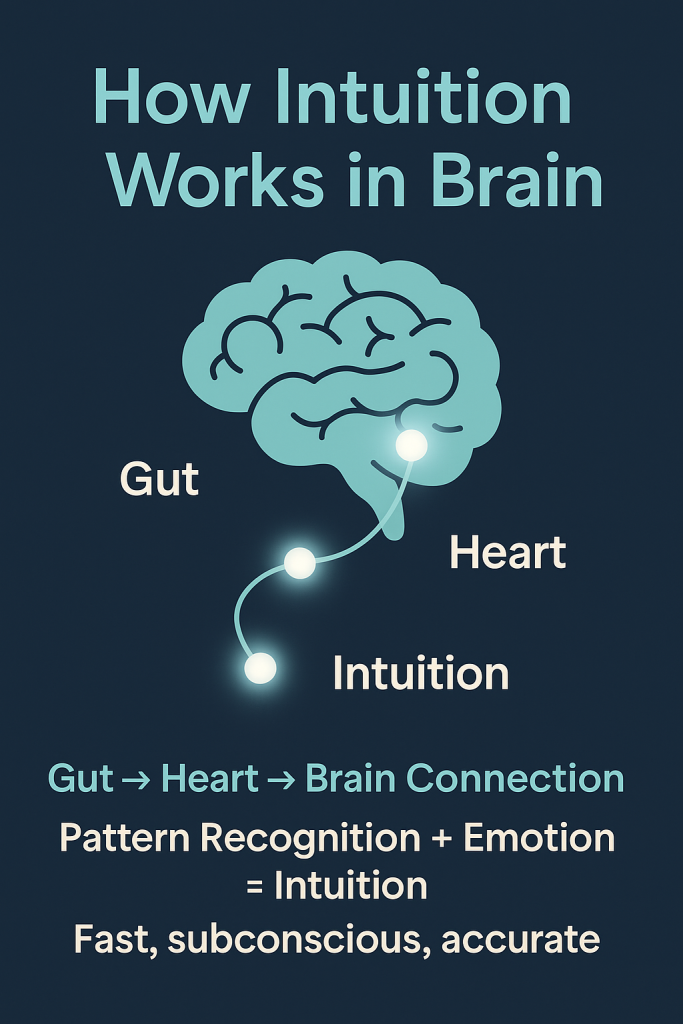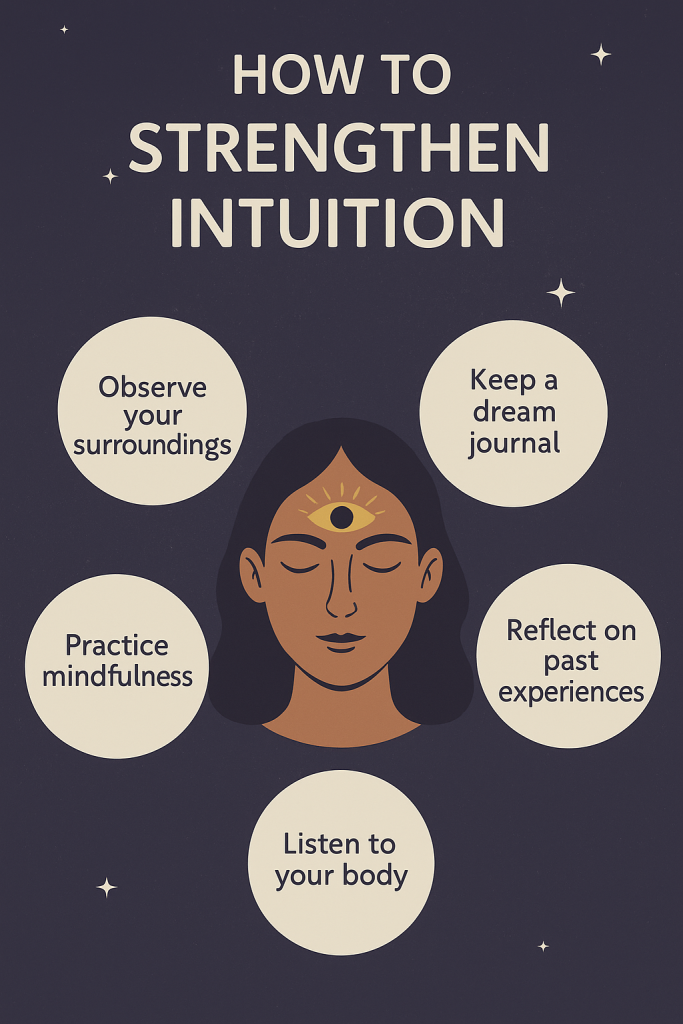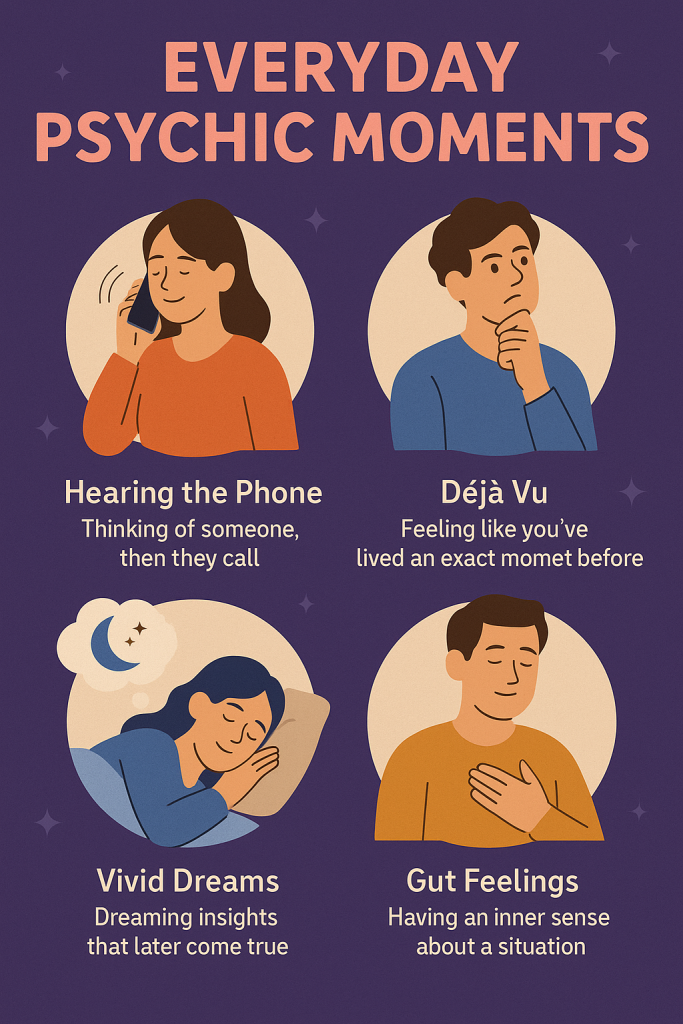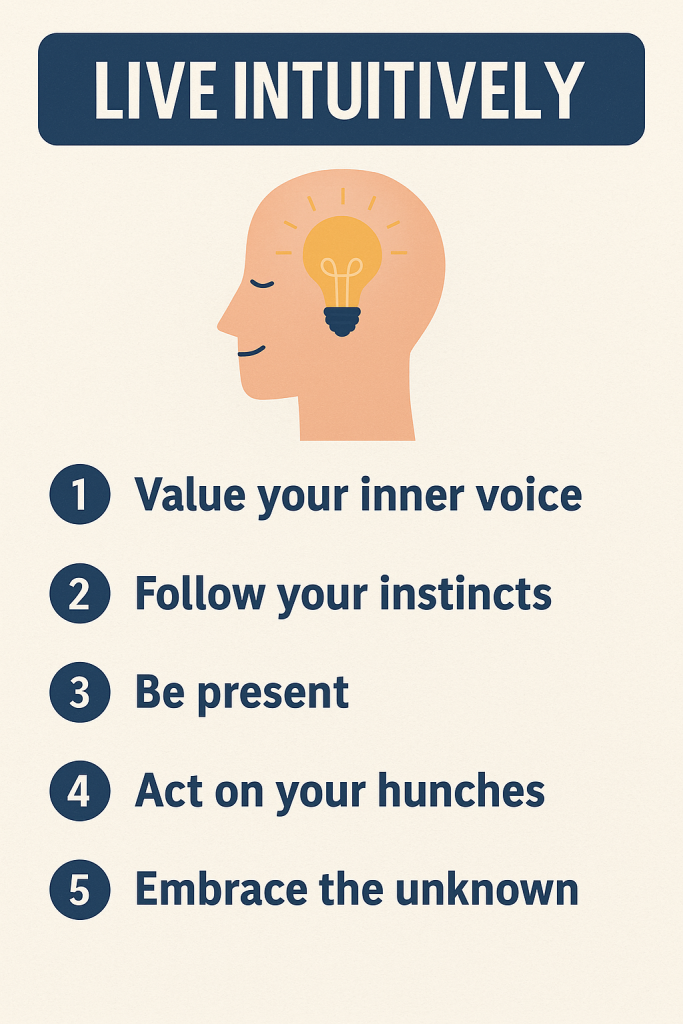In a world of constant noise, our intuition is often the first sense we lose and the last one we remember. We scroll, we analyze, we second-guess—but that quiet inner nudge? It gets drowned out by algorithms and overthinking. Yet, long before phones and forecasts, intuition was humanity’s original survival tool. It helped us sense danger, recognize opportunities, and choose the right path without needing proof.
Today, strengthening intuition isn’t about becoming mystical—it’s about becoming deeply human again. It’s the art of hearing what life is whispering before it starts shouting. Science now backs what sages always knew: intuition is real, measurable, and trainable.
What Intuition Really Is (and Isn’t)
Intuition is often described as a “gut feeling,” but it’s far more complex. It’s a blend of subconscious pattern recognition, sensory awareness, and emotional intelligence. It’s not the opposite of logic—it’s logic’s quiet partner.
The Brain Behind the Feeling

Neuroscientists have found that intuition arises when the brain rapidly draws from stored experiences to reach conclusions faster than conscious reasoning can. It’s your mind’s high-speed processor working behind the scenes.
For instance, firefighters often make life-saving decisions in seconds without fully knowing why. One firefighter in a study said he “just felt” a floor was about to collapse. He evacuated the team, and moments later, it did. That wasn’t luck—it was intuition analyzing sensory cues faster than thought.
Authoritative source: National Geographic – Can You Trust Your Gut?
Intuition vs. Imagination
Imagination creates; intuition perceives. One builds new ideas; the other recognizes truth already present. Imagination paints a picture; intuition knows which picture matters.
Think of it this way: imagination is your inner artist, while intuition is your art critic—it knows when something feels right without needing to explain why.
The Biology of Intuitive Knowing
Your intuition doesn’t start in your mind—it begins in your body. The gut, heart, and brain communicate through an intricate network of neurons, often called the gut-brain axis. The gut contains over 100 million neurons, earning it the nickname “the second brain.”
The Body’s Secret Radar
Before you consciously react, your body already knows what’s coming. Studies from the HeartMath Institute show that the heart’s electromagnetic field responds to emotional stimuli several seconds before the brain registers them. That’s why you sometimes feel uneasy or excited “for no reason”—your body is reading the room before your mind can translate it.
Emotions as Data
We’re often taught to suppress feelings, but emotions are raw intuitive data. They tell you when something resonates or repels. Ignoring them is like muting your internal GPS.
When you say “I have a bad feeling about this,” it’s not drama—it’s biology. Your vagus nerve, which links the brain and gut, is firing off warnings. The key is to interpret, not dismiss, these sensations.
Authoritative link: Harvard Health – Emotional Intelligence
Why Intuition Feels Blocked (and How to Unblock It)
In our overstimulated world, intuition doesn’t disappear—it just gets buried. Like static on a radio, noise drowns out the signal.
Common Intuitive Blockers
Digital Overload: Constant scrolling keeps the brain reactive, not receptive.
Emotional Residue: Old hurts cloud clarity.
Chronic Stress: Cortisol dulls intuitive processing.
Overthinking: Logic loops override inner guidance.
Reconnecting with Your Inner Frequency
A writer once shared how she “lost her gut sense” after years online. Her fix? A week without social media. She started walking daily without headphones, simply listening to wind, footsteps, and her own breath. Within days, she began sensing small things again—like knowing who was about to text before her phone buzzed.
Grounding techniques, mindfulness, and sensory simplicity revive your intuitive rhythm.
Authoritative link: Healthline – Grounding Techniques for Mind and Body
How to Strengthen Your Inner Signal

You don’t need special powers to be intuitive. You just need practice and patience.
1. Practice Micro-Noticing
Pay attention to body sensations when you make small choices—what you eat, what you say yes or no to. Your body will subtly tighten or relax around truth.
2. Sensory Immersion
Pick one sense a day to focus on: sight, sound, taste, touch, or smell. For five minutes, let that sense lead. You’ll be amazed how awareness amplifies intuition.
3. Prediction Journaling
Write down daily intuitive “hunches,” from who might email you to how a meeting will feel. Check results at day’s end. Over time, accuracy improves as trust grows.
Example: a therapist tracked intuitive sensations about her clients’ emotional states. Within months, she noticed her “gut notes” matched their real feelings 80% of the time.
Intuition grows with evidence—so give it data to work with.
Emotional Intelligence and Intuitive Accuracy
Your heart is a better scientist than you think. When you regulate emotions, you read energy more accurately.
Empathy vs. Absorption
Empathy amplifies intuition; emotional fusion dulls it. The goal is to feel with others, not for them. When you absorb their emotions, you lose your own calibration.
Tip: When listening to someone, notice where your attention is. If you start feeling their fatigue or sadness, silently say, “I witness this, but it’s not mine.” That single boundary sentence can restore intuitive neutrality.
Authoritative link: Harvard Health – Self-Regulation for Adults
The Role of Energy Awareness
Every intuitive insight begins with energy. You sense it when someone walks into a room and the mood shifts, or when a place feels inexplicably heavy or calm. This isn’t imagination—it’s energetic information being processed by your nervous system.
Reading Energy Without Overwhelm
Energy awareness doesn’t require seeing auras or lights around people; it starts with simple observation. When you feel drained after talking to someone, that’s energy exchange. When you feel uplifted after being in nature, that’s energy restoration.
Grounding is the key. Imagine plugging your body back into the Earth, like recharging a phone. Spend time barefoot, take a salt bath, or visualize light flowing through you. These simple acts discharge static energy and restore clarity.
Example: A psychic reader on PsychicOz noticed that after multiple readings, her insights grew fuzzy. She began ending each session by running her hands under water for 60 seconds, visualizing energy washing away. Within a week, her accuracy improved.
Authoritative link: Healthline – Grounding Techniques for Mind and Body
Keep Your Energy Field Clear
Think of your aura like your Wi-Fi signal—if too many connections crowd it, the speed drops. Limiting gossip, negativity, and overstimulation keeps your field strong. Clarity of energy equals clarity of intuition.
The Hidden Link Between Creativity and Intuition
Creativity and intuition are twin flames. Both thrive on flow states, both require trust, and both bridge the seen and unseen.
The Science of Creative Flow
Brain scans show that during creative flow, the prefrontal cortex—the inner critic—temporarily quiets, allowing spontaneous insight to emerge. That’s the same state psychics and intuitives describe when channeling information: alert but effortless awareness.
History’s Intuitive Creators
Paul McCartney dreamed the melody of Yesterday before ever writing a note.
Nikola Tesla said inventions “appeared fully formed” in his mind.
Maya Angelou described intuition as “the companion of creativity.”
When you create—whether painting, cooking, or brainstorming—you strengthen the neural pathways that allow intuition to surface naturally.
Tip: Before creating anything, close your eyes and ask, “What wants to come through me today?” You’ll notice how easily the intuitive mind responds when invited gently.
The Humor of the Universe: How Intuition Speaks Through Play
The universe loves irony. Intuition rarely shouts; it winks. It hides clues in repetition, humor, and timing that feels too precise to be random.
The Cosmic Wink Phenomenon
Ever had a song lyric follow you for days? Or a phrase on a billboard echo something you just thought? These coincidences are often messages meant to confirm alignment. Spirit uses humor and lightness because laughter keeps the intuitive channel open.
Example: One woman kept losing her car keys whenever she ignored her instincts about taking a new route to work. The third time it happened, she finally followed her gut, took the alternate road—and avoided a massive traffic jam. The universe had a sense of humor.
When intuition speaks playfully, it’s reminding you: don’t take awakening too seriously.
When Intuition Turns Psychic
All psychics are intuitive, but not all intuitives are psychic—yet. Psychic ability is intuition stretched across greater distances of perception.
Everyday Psychic Moments

A parent suddenly feels uneasy and learns their child had a fall miles away. A friend dreams of someone they haven’t seen in years, and that person calls the next day. A nurse senses a patient’s decline moments before monitors sound.
These moments don’t break the laws of nature—they reveal how connected consciousness really is.
Authoritative link: National Geographic – The Science of Intuition
Training the Psychic Edge
You don’t force psychic awareness—you relax into it. Meditation, energy balancing, and journaling dreams create conditions where higher sensitivity thrives. The more peace you cultivate, the louder subtle guidance becomes.
Living Intuitively in a Skeptical World

The greatest challenge to intuition isn’t disbelief—it’s self-doubt. People often sense truth but silence it to appear rational. The goal isn’t to convince others; it’s to stay authentic while they catch up.
Protecting Your Inner Compass
Not everyone will understand how you “just know.” That’s okay. Keep your insights sacred until they prove themselves. Record intuitive experiences privately; over time, results speak louder than explanations.
Talking About Intuition Intelligently
You can bridge worlds by blending science and spirit. Mentioning neuroscience, energy psychology, or emotional intelligence grounds intuition in credible language. The more fluently you translate it, the more respect it earns.
Example: A corporate executive began making major decisions based on intuition after tracking patterns between her instincts and outcomes. She presented data showing her intuitive calls improved project success rates by 30%. Skeptics became curious instead of dismissive.
The Confidence of the Intuitive
Living intuitively isn’t about being right all the time—it’s about being aligned. The more you trust your guidance, the more gracefully life flows. Intuition becomes less about guessing the future and more about dancing with it.
Conclusion
Intuition is not a rare gift—it’s an ancient skill awaiting your attention. It’s the inner compass that navigates the unseen currents of life, guiding you toward choices your logic can’t yet explain.
Reclaiming intuition is about listening deeply—to your body, emotions, environment, and the gentle rhythm of existence itself. When you quiet the external noise, you’ll find that your inner voice never stops speaking.
In a noisy world, intuition is your silence—your sanctuary, your truth.
FAQ: Increasing Your Intuition
1. Is intuition real or just imagination?
Intuition is rapid, subconscious pattern recognition plus body-based sensing; imagination creates, intuition perceives.
2. How can I tell intuition from anxiety?
Intuition feels calm and brief; anxiety feels urgent, repetitive, and emotionally charged.
3. Can anyone improve intuition, or is it innate?
Everyone has intuitive capacity; consistent practice, grounding, and emotional regulation strengthen it.
4. What daily routine boosts intuition fastest?
Five minutes of breathwork, a short grounding ritual, and one written hunch you verify later.
5. How do emotions affect intuitive accuracy?
Regulated emotions clarify signal; unprocessed feelings add “static” that distorts perception.
6. Does sleep quality matter?
Yes. Deep sleep consolidates subtle cues and dream insights, improving next-day clarity.
7. What is prediction journaling?
Write your hunches before events; later, compare outcomes to build trust and accuracy.
8. How does grounding help?
It calms the nervous system and discharges excess energy, making subtle cues easier to read.
9. What’s a quick grounding method I can do anywhere?
Slow exhale to a count of six, feel your feet, and mentally note three sensations.
10. Can technology support intuitive training?
Yes—meditation timers, heart coherence apps, and brainwave headbands provide feedback loops.
11. How do I avoid absorbing others’ emotions?
Label sensations as “mine/not mine,” visualize a breathable boundary, and ground after conversations.
12. What role does body awareness play?
Interoception—tracking internal sensations—helps you notice intuitive yes/no signals.
13. How can I practice without tools?
Use micro-choices: ask your body which food, route, or timing feels quietly right.
14. Are divination tools required?
No, but tarot, pendulums, or runes can translate impressions into symbols you can test.
15. How do I verify intuitive hits ethically?
Journal time-stamped impressions, seek noninvasive confirmations, and respect privacy.
16. What blocks intuition the most?
Overstimulation, chronic stress, unresolved emotion, and constant second-guessing.
17. How do I involve logic without smothering intuition?
Let intuition propose options; let logic evaluate feasibility, risk, and next steps.
18. Can skeptics succeed with intuition training?
Yes. A curious, experimental mindset often accelerates measurable gains.
19. How long until I notice improvement?
With daily micro-practice, many notice clearer signals within two to four weeks.
20. What’s the difference between empathy and overwhelm?
Empathy feels connected and clear; overwhelm feels fused, foggy, and draining.
21. Do diet and hydration influence intuition?
Stable blood sugar and hydration reduce noise and support nervous-system balance.
22. How do dreams fit into intuitive growth?
Dreams compress symbols and patterns; recording them reveals guidance trends.
23. What’s a safe beginner practice with others?
Energy-scanning games: share neutral impressions with consent, then validate kindly.
24. How do I keep from copying other readers’ styles?
Track your own data, honor your natural “language” (seeing, feeling, knowing, hearing).
25. What if my hunches are wrong?
Treat misses as data—check state (tired? anxious?), refine the protocol, continue.
26. Can humor help intuition?
Yes. Play lowers defense and invites “cosmic winks” that confirm alignment.
27. How do I talk about intuition in skeptical spaces?
Use clear language: decision hygiene, pattern recognition, and emotional regulation.
28. When does intuition become psychic ability?
When trust, practice, and energy clarity extend perception beyond ordinary cues.
29. How do I set an ethical scope for intuitive work?
Gain consent, avoid directives on health/finance, and encourage client agency.
30. How will I know I’m improving?
Calmer reads, more specific hits, cleaner boundaries, and outcomes that validate later.





The recommendation to meditate is sound. It’s well-known that meditation can enhance mental clarity and openness. This article does a good job of linking such practices to intuitive development, which is often overlooked in mainstream discussions.
What a profound and enlightening article! The emphasis on trusting one’s intuition as a vital guide in life deeply resonates with me. In a world filled with external noise and distractions, it’s refreshing to be reminded of the wisdom we all carry within. The practical steps provided, such as meditation and journaling, are invaluable tools for anyone seeking to strengthen their intuitive capabilities. This piece eloquently captures the essence of self-trust and the power of inner guidance. A truly inspiring read!
The structured approach to improving intuition, from listening to oneself to taking action, is logical and well-explained. Many people underestimate the value of intuition, and this article does a good job of providing practical steps to harness it.
I appreciate the suggestion to journal intuitive insights. Documenting experiences can indeed help in recognizing patterns and understanding the subtleties of one’s intuition. The article’s advice on asking clear, specific questions is also a valuable tip.
The insights provided here about the power of intuition are incredibly enlightening. It’s fascinating to consider that everyone possesses an innate ability to sense things beyond the obvious. Highlighting the subtlety of intuitive messages and the need for self-trust resonates deeply. The practical advice on meditation and journaling to enhance this skill is particularly useful. Engaging in these practices can indeed foster a stronger connection to our inner voice, which could be crucial for personal growth and decision-making.
The emphasis on intuition in guiding one’s life journey is intriguing, but let’s not disregard the empirical evidence provided by science and rational thinking. While it’s true that intuition can offer valuable insights, it’s often the product of subconscious processing of information we have already encountered. Therefore, a balanced approach combining intuition with critical thinking and empirical analysis seems more prudent. Blindly trusting intuition without rigorous questioning could lead one astray just as easily as ignoring it altogether.
The article provides a comprehensive guide to tapping into one’s intuition. The emphasis on various methods such as meditation, journaling, and taking action is particularly useful. Trust in oneself is fundamental, and I appreciate the systematic approach presented to develop this trust.
I find the advice on differentiating one’s inner voice from other voices insightful. The examples given, such as feeling watched or thinking about someone before they call, are relatable and illustrate how intuition operates in everyday life.